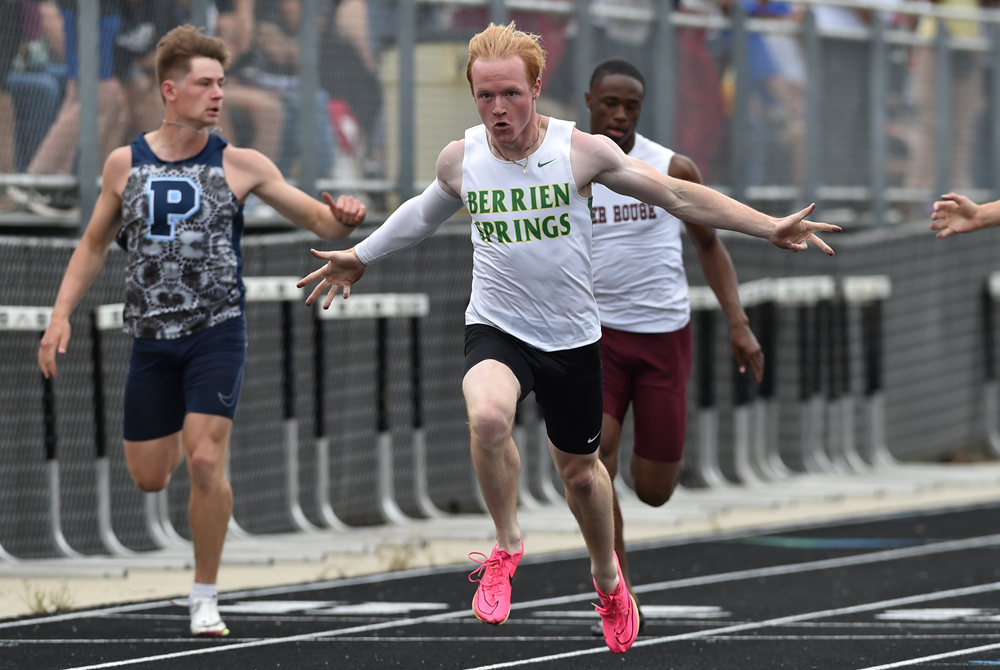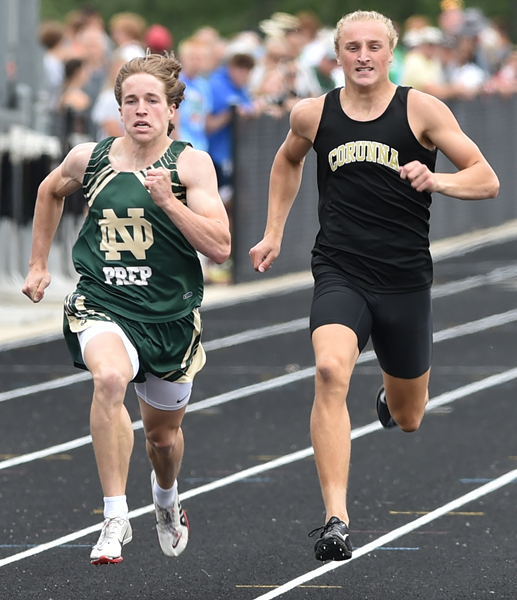
Add, Subtract, Divide, Multiply: MHSAA Not Alone
July 25, 2017
By Rob Kaminski
MHSAA benchmarks editor
This is the third part in a series on MHSAA tournament classification, past and present, that will be published over the next two weeks. This series originally ran in this spring's edition of MHSAA benchmarks.
As the MHSAA faces its most recent classification task with 8-Player Football, and opinions continue to swirl about as to the method, timeframe, location and other procedures, a look around the country provides plenty of company among state association brethren factoring variables into their own equations.
In the Pacific Northwest, the Oregon School Activities Association Football Playoffs are under public scrutiny as leadership ponders a five or six classification format beginning with the 2018-19 school year.
The OSAA has crowned six champions on the gridiron since 2006-07. Many of the state’s smaller schools would like to keep it that way, while larger schools lean toward a five-classification system, citing larger leagues, ease of travel and credibility to state championships as the advantages.
Still others would prefer more than six classes, pointing to safety issues and the opportunity to increase participation numbers as positives.
Moving southeast of Oregon, the Nevada Interscholastic Activities Association recently voted to hold serve on a classification proposal that was volleyed to the membership.
However, changes still could be forthcoming by as early as the 2018-19 season which would add a fifth classification in more populated southern Nevada while allowing northern schools to participate in four classifications. Such divisions could mean no state championship for the fifth class in southern Nevada.
Because of that, the NIAA wants equal numbers of schools in each classification on both ends of the state. Complicating the issue is the fact that the 24 largest schools in the state, by enrollment, are all in Clark County in Southern Nevada.
Across Nevada’s border into Arizona, charter schools are asking the Arizona Interscholastic Association to reconsider classification that was voted upon and approved in September 2015. That agreement called for the largest 33 percent of charter schools by enrollment to be placed in the state’s largest school classification, 3A, the middle 33 percent into 2A, and the smallest 33 percent into 1A.
Less than two years later the charter schools have had a change of heart and have asked to be considered the same as other Arizona public schools and be placed appropriately by enrollment beginning with the 2018-19 school year.
The situation in Arizona further illustrates how the public/private debate that all state associations have faced throughout existence now has the added dynamic of rapidly growing charter schools in today’s educational system, along with virtual school enrollment.
In the nation’s heartland, Nebraska has retooled its football classifications by using enrollment of boys students only in its schools rather than total enrollment. The Nebraska School Activities Association football-playing schools will kick off the 2018 season using this alignment.
Nebraska has three classes of 11-player football, with the smallest class divided in two, Class C-1 and C-2. The state also will have 8-player football for boys enrollments under 47, and the NSAA will sponsor a new 6-player tournament in 2018 for schools with 27 or fewer boys.
“This is a good proposal because some schools have a sizable imbalance between the number of boys and girls, and there’s a large gap (in enrollment) between the largest and smallest schools in Classes A and B,” NSAA executive director Jim Tenopir said. “I think this addresses both of those concerns.”
Swimmers in Georgia, meanwhile, will feel like they are moving with the current, rather than upstream in 2017-18, as the Georgia High School Association recently doubled the number of team championship events from two to four.
Swim enthusiasts can also count on longer days at the finals, as the top 30 finishers from the prelims will advance to the finals instead of 20, and all championship events will have three heats versus two.

Machiniak Sets Pace as Berrien Springs Edges Corunna in Matchup of Recent Champs
By
Scott DeCamp
Special for MHSAA.com
June 1, 2024
HAMILTON – After a rainy afternoon Saturday, the precipitation let up long enough for Berrien Springs’ boys track & field team to put the finishing touches on another MHSAA Lower Peninsula Division 2 Finals championship.
After Shamrocks head coach Jon Rodriquez collected his program’s second team title in three years, rain fell again at Hamilton High School’s Hawkeye Stadium, only heavier this time.
The reign returned for Berrien Springs.
“It feels great, man. It’s hard to say what it feels like,” said Shamrocks senior standout Jake Machiniak, who sprinted to first-place finishes in the 100- and 200-meter dashes plus anchored winning 400 and 800 relays.
“This team, they worked all offseason. This is the hardest group of workers I’ve ever had. All these guys, all the guys that scored, they’ve all come year-round. The relays, we performed. I performed in the opens. It’s great. It’s a great feeling, man. Two times, man. Two times. Second time winning the state. It’s fantastic, man.”
Machiniak, a Grand Valley State University commit, repeated in the 100 with a time of 10.74 seconds. He won the 200 in 21.76 seconds in addition to running the closing leg on Berrien Springs’ first-place 400 relay (42.13) and victorious 800 relay (1:28.24).
Machiniak powered Berrien Springs to 40 points as a team, allowing the Shamrocks to edge runner-up Corunna (38 points), the 2023 champion. DeWitt was third (34) and Charlotte fourth (28), followed by Pontiac Notre Dame Prep and Parma Western tied at fifth (26).
Last year, Berrien Springs tied for seventh, which fueled the Shamrocks’ hunger all offseason.
“Jake was on that team two years ago. He ran the 4x100 for us,” Rodriguez said. “We’ve kind of had our eyes on this the last two years. Last year we fell short a little bit, and this year the kids were hungry. They worked their butts off all year long, running in the summertime, running in the hallways in the wintertime, just getting ready for this moment. It’s awesome. It’s awesome to see.”
In the 400 relay, Machiniak was joined by Zander White, Samuel Magesa, and Kameron Autry. In the 800, it was Magesa, White, and Noah Jarvis.
Notre Dame Prep senior Zachary Mylenek took first place in the 400, finishing nearly a second better than his personal-record time of 48.49 seconds, and he was runner-up in the 200 (with a personal season-record 21.92).
Bound for Purdue University, where he plans to study mechanical engineering and perhaps walk on to the Boilermakers’ track team, Mylenek also anchored Notre Dame Prep’s seventh-place 1,600 relay team.
 He adapted to his circumstances and performed at a high level.
He adapted to his circumstances and performed at a high level.
“The rain sucked, but I’ve been fortunate enough because we’ve been running in the rain a lot this year and I ran last year in it,” he said. “I just ran my race and other guys, I was listening, they don’t like running in the rain. It’s a mindset thing, and I just dialed in.”
Grosse Ile junior Sam Vesperman repeated in pole vault with an effort of 14 feet, 7 inches.
Vesperman was not expected to win last year, and he pulled it off. Being ranked No. 1 in pole vault coming into Saturday’s meet created more pressure for him.
“It was definitely different because I was projected to win it (this season),” Vesperman said. “Last year I was the second guy, right – I wasn’t the big name. It was definitely different having everybody (saying), ‘Oh, that’s the guy to get, so … .’”
Vesperman’s official personal record in pole vault is 15-3. On Saturday, he was pushed by Whitehall senior Ca’Mar Ready, who turned in a PR effort of 14-4, but Vesperman was able to execute when needed.
“Yeah, it’s really nice to win, but we just keep chasing that next bar, that next height. That’s definitely the motivational factor,” Vesperman said.
Other event winners included: Clio’s Elliott Sirianni in the 800 (1:55.09 PR), Freeland’s T.J. Hansen in the 1,600 (4:11.31), Pinckney’s Paul Moore in the 3,200 (9:07.53), Grand Rapids Catholic Central’s Mill Coleman in the 110 hurdles (14.49), Charlotte’s Cutler Brandt in the 300 hurdles (38.48), Coopersville’s Gabe VanSickle in the shot put (61 feet, 2 inches), Wayland’s Adam Huff in discus (172-0), and Stevensville Lakeshore’s Declin Doroh in high jump (6-7) and Kaden Griffiths in long jump (22-9.25).
Hamilton won the 1,600 relay (3:23.40), while Marshall took first place in the 3,200 relay (7:48.49). Chelsea senior Jacob Nelson won the 100, 200 and 400 adaptive events.
Rodriguez started coaching at Berrien Springs in 2012, and he became head coach in 2014.
He said the Shamrocks improve in practice because there’s a lot of competition. Everybody is chasing Machiniak.
“I mean, we have Jake Machiniak, one of the top sprinters in the state, in practice and the kids want to beat him. They don’t just want to just, like, run with him; they want to try and beat him, so that competition in practice has been huge,” Rodriguez said.
“I’m just very proud of them. We showed up on the days that were important. On a big meet like this, it’s about being your best today – we had our best on the best day.”
Like Vesperman, Machiniak entered the 2024 season with a lot of pressure. He noted, however, that the only way to improve is to put oneself in pressure situations.
Machiniak said this team title feels better than the one won in 2022 because he played a bigger role. There’s strength in numbers, though, and Berrien Springs has been known to possess depth, especially in the sprints.
“That’s all Coach Rodriguez. Best coach in Michigan – it’s not even close,” Machiniak said. “He has us training in the offseason. He has us training winter, summer, spring, fall – all the time, man. We have a lot of guys at the state meet that come (put in the work) in the offseason, all year round. Year-round athletes that do speed training. As far as the sprints, that’s all Jonny Rodriguez – best coach in the nation.
“This group, I’ve grown up with this group, man. I’ve known these guys for a while. I’ve grown with them, I’ve trained with them, I’ve cried with them. You know, these are the guys that I’ve grown up with.”
PHOTOS (Top) Berrien Springs’ Jake Machiniak, second from left, crosses the finish line first in the 100 during the Lower Peninsula Division 2 Finals on Saturday. (Middle) Pontiac Notre Dame Prep’s Zachary Mylenek, left, and Corunna’s Wyatt Bower race to the finish in a 200 prelim. (Click for more from Dave McCauley/RunMichigan.com.)

